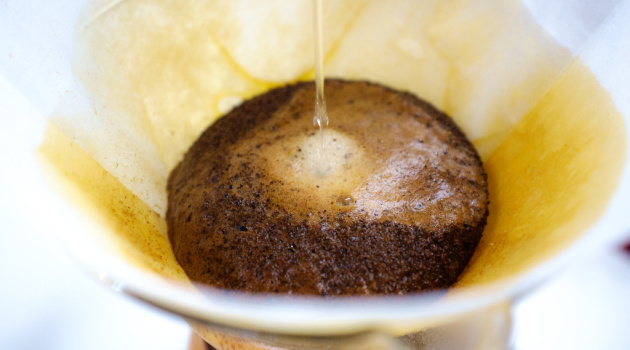Coffee beans or ground coffee?
That’s an ongoing and lively debate here among the staffers DIY Home & Garden. And we are not alone.
Imagine this. You are at the supermarket and keep darting your eyes between the product offerings in the coffee aisle. You’ve not moved from your spot for over 10 minutes and chances are you’re beginning to get weird looks from other shoppers. But you really don’t care, do you?
It’s coffee, people! And everyone knows that the matter of coffee is a serious one that requires careful consideration before making a decision.
So, the packet of whole coffee beans temptingly whispers your name but the cans of ground coffee on the adjacent shelf keep hollering, “Come on, you’ve always picked us. Why the delay, mate?”
And they’re not wrong. You’ve always gotten your caffeine fix with normal pre-ground coffee. But a couple of your friends swear by whole beans and dismiss your usual cuppa with a disdainful sniff.
Now you’re intrigued and possibly wondering, “What’s wrong with ground coffee?” Nothing, my friend. Nothing at all. Beauty is in the eye of the beholder and in this case, the best coffee depends on who’s drinking it.
Only you can decide which is the best option for you. But for you to make that decision (and make it quickly. You’ve really been in that aisle for too long), you need to have all the facts. And that’s why I’m here!
Coffee Beans or Ground Coffee: What Exactly is the Difference?
When java beans are harvested and roasted, either of the two scenarios occurs. They are ground into fine particles, packed into air-tight containers, and branded as pre-ground coffee. Or the grinding part is skipped and the coffee beans packaged and sold whole to the end-user who then has to grind them before brewing.
They are both coffees. Decidedly one has been further processed, but what makes one better than the other?
Let the judging begin.
Timing and Convenience
In our go-go world of today where everyone’s always on the move, we all crave convenience and accessibility any way we can get it.
Let’s play a game. It’s six o’clock in the morning. You drag yourself from your bed and trudge half-heartedly to the kitchen, your mind sluggishly cataloging the million tasks you have to achieve for the day while your body screams for coffee. Do you:
- Toss coffee pod into your Keurig and wait for the timer to ping?
- Start the meticulous process of grinding coffee beans?
Chances are you’d pick option A. Why? Because it’s easy, fast, and convenient. Nobody wants to spend their precious time doing what they could pay someone else to do for them.
So, who wins this round? Ground coffee, of course!
 Grinding and Brewing
Grinding and Brewing
If convenience is not a decisive factor for you as it is for most people, then you probably picked option B. And you’re probably thinking, “All I have to do is grind and then brew, right?”
Wrong!
There is a delicate process to grinding and brewing coffee beans. Brew finely-ground particles in a percolator and you’d end up with a bitter drink you won’t be able to push down your throat. Grind your beans into coarse grounds but have a French press for brewing? You won’t be enjoying your coffee that day either.
With whole coffee beans, you have to be very exact when grinding and also quite sure you’re using the correct brewing method for the texture of your coffee grounds.
Ground coffee, on the other hand, takes most of the guesswork out of the game.
Who wins this round? Ground coffee, again!
Variety of Options
But let’s say you get your grinding and brewing just right, there’s a whole world of coffee richness waiting for you to explore with your whole coffee beans.
With pre-ground coffee, you get exactly what the manufacturer wants you to have. A uniformly ground particle that gives you a specific type of flavor. Nothing more, nothing less.
But with coffee beans, you’re not held back by any such restrictions.
You are free to experiment with grinding the beans into different textures and once you brew them right, end up with different yet exciting tastes of java.
Freshness
Ever notice how ground coffee that has been on your shelf for more than two weeks tastes a bit stale even when freshly brewed?
That’s because once coffee beans are ground, they quickly begin to lose their freshness from that moment on. So, you might be in luck and purchase a recent batch of pre-ground coffee from the mall, and the first few cups might be great. A couple of weeks later? Not so much.
But if you do buy whole coffee beans instead, the freshness Is maintained till you’re ready to grind, brew, and drink. This way, you get to enjoy the exquisite taste of freshly grounded coffee every single time. And let’s not talk about that invigorating aroma that only a fresh cup of joe gives.
Coffee beans win this round hands down.
Relative Cost
If you’ve known nothing but ground coffee virtually all your life and want to make the switch to coffee beans, then you have to bear in mind that the whole-beans route costs slightly more than regular pre-ground coffee.
For one, whole coffee beans are usually sourced from specific locations outside the country, Brazil, for example, to provide that exotic taste that sets them apart from packaged coffee grounds. This means higher shipping fees and a couple more dollars to shell.
You might have to get an Espresso machine as well. Your Keurig won’t cut it anymore.
So if the price is a huge deciding factor for you, then simply stick to ground coffee.
 The Takeaway: Time to choose between whole beans or ground coffee
The Takeaway: Time to choose between whole beans or ground coffee
At the end of the day, choosing between ground coffee and whole beans depends on your tastes and preferences.
If you’re always on the go and just don’t have those extra minutes to spend on grinding coffee beans before getting your much-needed caffeine fix, then convenience beats exquisite taste every time. Ground coffee it is.
But if your taste buds are much more refined and you really can’t swallow any swill posing as coffee, whole beans are the way to go. Put in the time, effort, and resources to enjoy that unbeatable taste and aroma that only a fresh cuppa can give you.




